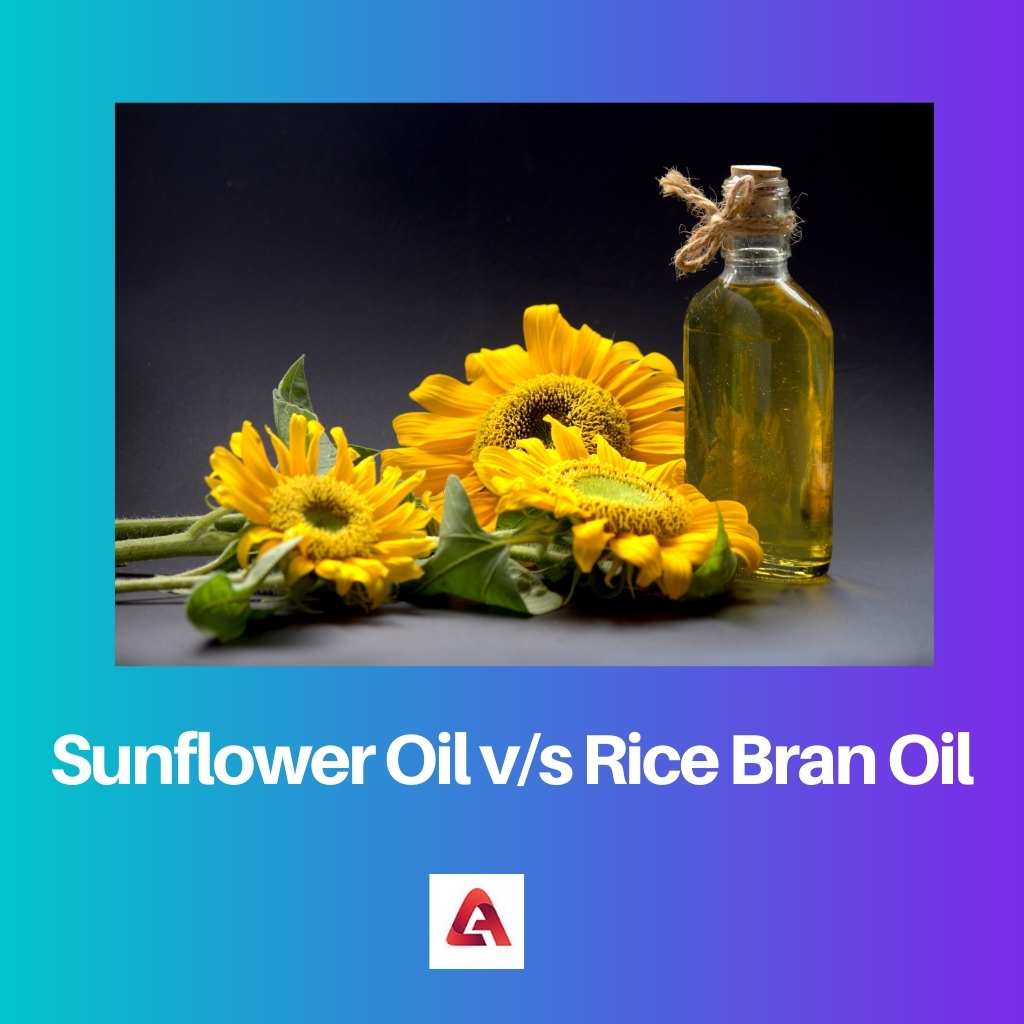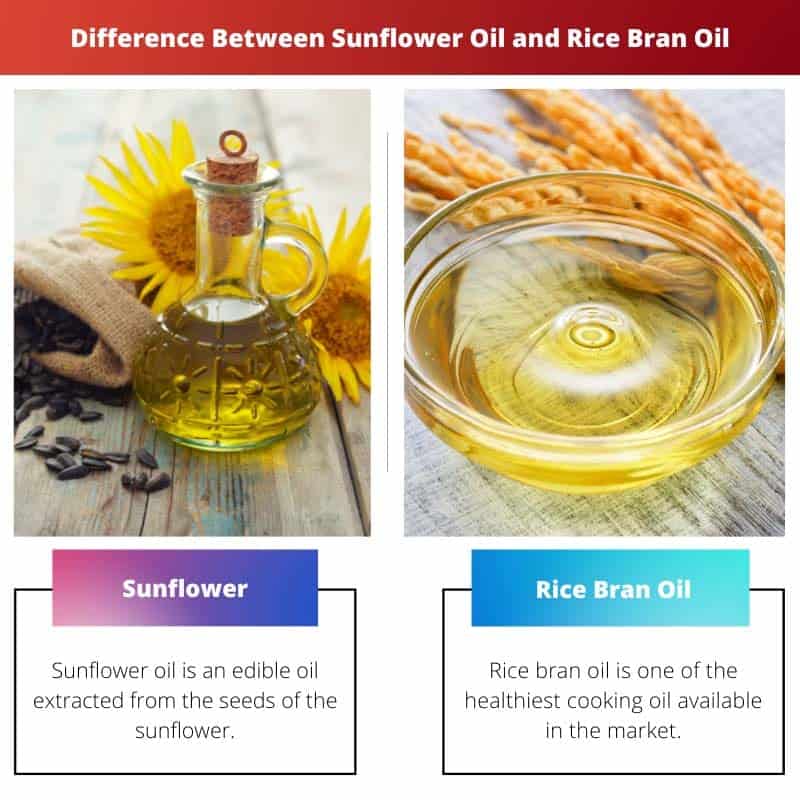Eating healthy food is required to live a healthy lifestyle, and the crucial element for making healthy food is cooking oil. Oil plays a significant role in shaping your health, diet, and taste of the food.
When on a healthy diet: the food you eat is crucial; so is the oil; due to this, choosing the right oil is always important.
Key Takeaways
- Sunflower oil is extracted from sunflower seeds and has a higher smoke point and neutral flavor than rice bran oil, extracted from the outer layer of rice grains.
- Rice bran oil has more antioxidants, vitamins, and minerals than sunflower oil, making it a healthier option.
- Sunflower oil is more commonly used for cooking and frying, while rice bran oil is used in cosmetics and personal care products.
Sunflower Oil v/s Rice Bran Oil
The difference between sunflower oil and rice bran oil is that sunflower oil is an edible non-volatile extracted from sunflower seeds. It is commonly used as cooking oil; or as a moisturizer for the skin. On the other hand, rice bran oil is from the brown outer layer of rice: known as chaff.

Sunflower oil is an edible oil extracted from the seeds of the sunflower. It has a neutral taste, due to which this oil is used: for frying at high temperatures.
Other than being used in culinary, this oil has many other uses: the formulation of this oil is processed and made into a skin moisturizer, it is mixed with other fuels for running diesel engines, etc.
Rice bran oil is one of the healthiest cooking oil available in the market.
The oil has a balanced proportion of polyunsaturated and monounsaturated fats: which makes it an ideal option for a healthy heart, and many studies have proved that this oil reduces the risk of heart diseases and diabetic conditions.
Comparison Table
| Parameters of Comparison | Sunflower Oil | Rice Bran Oil |
|---|---|---|
| Extracted from | Sunflower seeds | The outer cover of rice grains |
| Monounsaturated fats per serving | 6 grams | 5 grams |
| Vitamin E in tbsp | 37% | 29% |
| Calories | 124 | 120 |
| Highest production | Ukraine and Russia | India, Japan, China, Thailand. |
What is Sunflower Oil?
Sunflower oil is from the sunflower’s pressed seeds mainly used for frying in culinary and as emollient in cosmetics. This oil is composed of linoleic and oleic acids; and polyunsaturated and monounsaturated fats.
Oil with differing amounts of fatty acids is produced; by using selective breeding and manufacturing processes. The oil is extracted with a mild neutral taste and contains a good amount of vitamin E.
The growth of hybrid sunflowers and genome analysis are under developing stage; since 2017, that would result in increased production of sunflower oil, meeting the demands of the consumers.
Sunflower oil is composed of less stable fatty acids; there are chances that it could get degraded by heat, light, and air that can react with the oil and oxidize.
During the manufacturing and storing process: sunflower oil is kept in dark-colored glass or plastic bottles at low temperatures; to prevent the rancidity and loss of nutrients.
The refined sunflower oil imitates a vegetable triglyceride; therefore, it is suitable for frying food at high temperatures. The unrefined version of this oil: is used as dressings for salads in European countries.
When the oil is extracted from the seeds, it leaves behind crushed seeds known as seed meals, used to feed animals or fertilizers. Sunflower oil is also used as fuel to run diesel engines due to its high viscosity level.

What is Rice Bran Oil?
Rice bran oil is derived from the outer cover of rice grains called chaff. As this oil has a high smoke point, it is used for cooking food on high heat and is mostly used in the Southern and Eastern parts of Asia.
Apart from its uses in cooking, this oil also has many health benefits that are proven by research. This oil provides a good amount of vitamins and minerals.
Some studies have concluded that this oil reduces cholesterol levels and if the person with high cholesterol substitutes rice bran oil for other fats, their health can show significant improvement.
It is because of the high concentration of Vitamin E present in rice bran oil. When rice bran oil is mixed with antihypertensive medication, it can help lower blood pressure. It also has oryzanol which reduces the risk of heart disease.
Ricebran oil has great flavors and high smoke points, due to which it possesses the nutrients even at high temperatures. This feature of rice-bran oil makes it a healthy edible oil for everyone.
This oil is processed with chemicals to suspend any toxins to produce refined rice bran oil. After this process, clear; and toxic-free oil is left behind, which have multiple uses.
Rice bran Oils are made refined by filtering them several times with an excessive amount of chemicals. This process makes the oil less nutritious as the vitamins and nutrients are suspended with the toxins.

Main Differences Between Sunflower Oil and Rice Bran Oil
- The seeds of sunflower are processed to extract sunflower oil. On the other hand, the outer brown layer that covers the rice grain is processed to extract rice bran oil.
- One tablespoon of sunflower oil contains six grams of monounsaturated fats. Whereas rice-bran oil has five grams of monounsaturated fats.
- Both the oils provide Vitamin E, but sunflower oil provides 37% of vitamin E per serving, whereas rice-bran oil provides 29%.
- India, China, Vietnam, Japan, and Thailand are the biggest producers and exporters of sunflower oil, whereas Russia and Ukraine are the biggest producers and exporters of rice bran oil.
- One serving of sunflower oil provides 124 calories, whereas one serving of rice bran oil provides 120 calories.

References
- https://www.sciencedirect.com/science/article/pii/S1933287415004535
- https://www.sciencedirect.com/science/article/pii/S0969806X15300451




